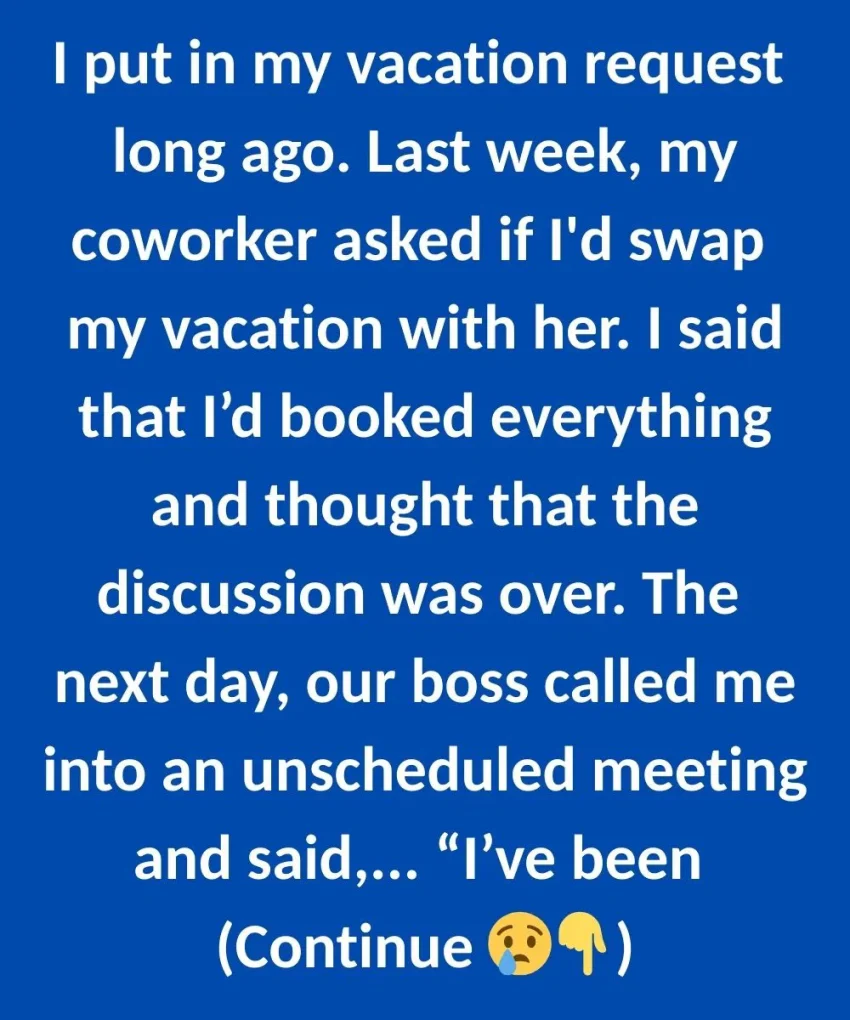Like children anticipating Christmas, most of us count down the days until our next holiday. However, what occurs when you are asked to give up your plans because someone else’s plans conflict with yours?
This is precisely what happened to Mark, a diligent professional, when a colleague requested him to exchange his pre-approved, paid vacation time so she could use her children’s school break. What began as a straightforward request swiftly evolved into a lesson about guilt, office politics, and the importance of personal time, regardless of whether you have kids or not.

Mark had everything arranged, including flights, accommodations, activities, and approval of his vacation request. This was a well-planned, long-awaited vacation, not a last-minute trip.
However, Lisa, a mother and coworker, saw that Mark’s authorized time off coincided with her kids’ school break. In order to enjoy a trip with her children, she requested that he switch the weeks of her vacation.
Since his plans were all set up and mostly non-refundable, Mark respectfully but firmly declined. The conversation’s tone shifted at that point
In a frustrated reply, Lisa said, “Really? Can’t you be adaptable? It’s only you, after all. It’s not as though you have dependent children.
Those were nerve-wracking words. The inference? Maybe because Mark was childless, his vacation time suddenly had less significance. He politely reminded her that having no children does not diminish the value of his time.
However, the tension only increased after that.
Apparently swayed by office gossip, Mark’s supervisor called him into an impromptu meeting the day after the embarrassing encounter.
“Lisa is trying to do something kind for her children, but she’s in a difficult situation. The manager remarked, “You could have been more understanding.”
“I’ve made non-refundable arrangements,” Mark insisted. My vacation time is also important.
The tension persisted in the office and in Mark’s thoughts even after the meeting concluded.

Was Mark acting inappropriately? Or is this an instance of the double standard that frequently appears in the culture of the workplace?
On the one hand, Lisa wanted to spend as much time as possible with her kids. When it comes to planning vacation time, parents frequently face greater limitations.
However, Mark complied with the procedure, made his request ahead of schedule, and was granted permission. He had made and paid for his plans. Most essential, regardless of whether he has parents or not, his time off is his own.
Many people who are not parents frequently experience pressure to be the “flexible ones” just because they are childless. However, everyone can benefit from personal time, whether it’s hiking in the Alps or simply relaxing at home.
This story brings to light an issue that is rarely mentioned in the workplace: the unwritten hierarchy of time off. Resentment and imbalance can result when bosses and coworkers give one person’s plans priority over another’s because of family status.
Mark wasn’t spiteful when he declined. He merely requested the same deference he would have shown to everyone else: that his plans and private life are equally significant.
Because being “just you” does not, in the end, imply that you are less worthy of respect.
Would you support Mark? Or do you believe that he could have been more adaptable?
Let’s respectfully discuss it in the comments.
